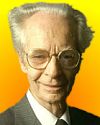 (source)
(source)
|
B. F. Skinner
(20 Mar 1904 - 18 Aug 1990)
American psychologist whose pioneering work in experimental psychology promoted behaviorism, shaping behavior through positive and negative reinforcement and demonstrated operant conditioning.
|
Science Quotes by B. F. Skinner (8 quotes)
A vast technology has been developed to prevent, reduce, or terminate exhausting labor and physical damage. It is now dedicated to the production of the most trivial conveniences and comfort.
— B. F. Skinner
Reflections on Behaviorism and Society (1978), 6.
Education is what survives when what has been learned has been forgotten.
— B. F. Skinner
In 'New Methods and New Aims in Teaching', New Scientist (21 May 1964), 22, No. 392, 484. One of several articles on the theme, 'Education in 1984'.
Instead of saying that a man behaves because of the consequences which are to follow his behavior, we simply say that he behaves because of the consequences which have followed similar behavior in the past. This is, of course, the Law of Effect or operant conditioning.
— B. F. Skinner
In Science and Human Behavior (1953), 87.
It is still true, even at the graduate level, that students study to avoid the consequences of not studying.
— B. F. Skinner
In 'B.F. Skinner Addresses Standing-Room-Only Crowd at Conference', Engineering Education News (Aug 1980), 7, No. 2, 3.
Physics does not change the nature of the world it studies, and no science of behavior can change the essential nature of man, even though both sciences yield technologies with a vast power to manipulate their subject matters.
— B. F. Skinner
In article 'Man', Proceedings of the American Philosophical Society (1964), 108, 482-85. Collected in Cumulative Record: Definitive Edition (2015).
The hypothesis that man is not free is essential to the application of scientific method to the study of human behavior. The free inner man who is held responsible for the behavior of the external biological organism is only a prescientific substitute for the kinds of causes which are discovered in the course of a scientific analysis.
— B. F. Skinner
In Science and Human Behavior (1953), 447.
The Law of Inhibition. The strength of a reflex may be decreased through presentation of a second stimulus which has no other relation to the effector involved.
— B. F. Skinner
In The Behavior of Organisms: An Experimental Analysis (1938), 17.
The real question is not whether machines think but whether men do.
— B. F. Skinner
Contingencies of Reinforcement (1969), 288.
See also:
- 20 Mar - short biography, births, deaths and events on date of Skinner's birth.
- B.F. Skinner: A Life, by Daniel W. Bjork. - book suggestion.
 In science it often happens that scientists say, 'You know that's a really good argument; my position is mistaken,' and then they would actually change their minds and you never hear that old view from them again. They really do it. It doesn't happen as often as it should, because scientists are human and change is sometimes painful. But it happens every day. I cannot recall the last time something like that happened in politics or religion.
(1987) --
In science it often happens that scientists say, 'You know that's a really good argument; my position is mistaken,' and then they would actually change their minds and you never hear that old view from them again. They really do it. It doesn't happen as often as it should, because scientists are human and change is sometimes painful. But it happens every day. I cannot recall the last time something like that happened in politics or religion.
(1987) -- 


